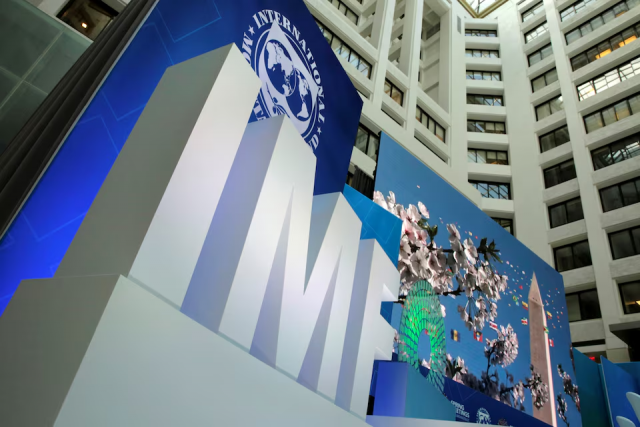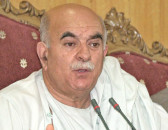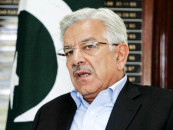IMF's tax demands leave PM in a bind
No dice with foreign lenders unless all exemptions are axed first, PM briefed

The International Monetary Fund’s (IMF) prior condition to slap an 18% sales tax on almost all items being sold in Pakistan, including on medicines, to qualify for a new bailout package on Friday left Prime Minister Shehbaz Sharif high and dry.
Following a briefing on the IMF's tax-related conditions, the prime minister refrained from immediately greenlighting the implementation of the condition in the budget. Instead, he instructed the finance ministry to go back to the drawing board, according to sources privy to the meeting.
Under the conditions, the Federal Board of Revenue (FBR) would need to set a tax collection target close to Rs12.9 trillion, nearly 40% higher than the expected Rs9.23 trillion collection for the current fiscal year.
The Rs12.9 trillion target implies that the FBR must recover an additional Rs3.7 trillion within a single year, a feat deemed nearly impossible due to the grinding wheel of the economy.
The finance ministry had presented a tax target of Rs12.4 trillion for the upcoming fiscal year to the prime minister, a figure that has now been raised to Rs12.9 trillion.
Following the departure of the IMF mission from Pakistan without reaching a staff-level agreement, the finance ministry provided the prime minister with the first detailed briefing on Friday regarding the tax-related conditions set by the global lender for the next bailout package.
Last week, the prime minister had received a briefing from the IMF concerning the overall budget size and expenditure-related conditions.
According to sources, additional prerequisites for the forthcoming bailout package include raising electricity rates effective from July, adjusting gas prices, and securing approval for the new budget in line with the IMF's recipe.
Furthermore, the sources indicated that the prime minister was informed that should Pakistan implement the condition to withdraw sales tax exemptions, an 18% sales tax would need to be levied on all goods sold in the country, excluding essential food items and those protected by sovereign deals.
PM Shehbaz received a clear message that securing a deal with the IMF hinged on the withdrawal of all sales tax exemptions. Rather than making an immediate decision, the PM tasked the finance ministry with reviewing the conditions.
Another meeting with the IMF is anticipated for next week.
‘Withdrawal of Rs1.5 trillion sales tax’
The estimated annual cost of sales tax exemptions amounts to Rs2.9 trillion, with Rs1.4 trillion attributed to exemptions on petroleum products. The proposed solution entails slapping a 5% sales tax on all petroleum products, as the rest of the sales tax impact is being recovered through the petroleum levy.
The sources said that if the IMF’s condition is implemented in letter and spirit, Pakistan will need to eliminate at least Rs1.5 trillion in sales tax exemptions in the upcoming budget. This would involve removing sales tax schedules 5th, which pertains to zero-rating, 6th, concerning exempted goods, and 8th, listing goods currently taxed below 18%, from the Sales Tax Act of 1990.
The income tax measures, which the government will take in the budget, will be over and above the sales tax measures. The income tax measures include increasing the tax rates for the salaried class, and non-salaried business individuals and ending reduced tax rates on income from the stock market, real estate and investment in the banks.
The IMF said on Friday that significant progress has been made towards reaching a staff-level agreement with Pakistan for an Extended Fund Facility, however, its mission returned to Washington without handing over a new bailout package.
The IMF’s two-week assessment mission concluded without striking a new deal as Islamabad grappled with the challenges of political instability and enhanced economic vulnerabilities.
“Building on the economic stabilization achieved through the successful completion of the 2023 Stand-by Arrangement, the IMF and the Pakistani authorities made significant progress toward reaching a Staff Level Agreement (SLA) on a comprehensive economic policy and reform program that can be supported under an Extended Fund Facility (EFF)," said Nathan Porter after the end of the visit.
Pakistani sources said that the implementation of all the conditions would put an extraordinary burden on the people and some conditions carry implications for bilateral relations.
In a highly unusual move, the IMF has linked the staff-level agreement with the prior approval of the executive board. Usually, the board’s approval is taken after reaching the staff-level agreement.
Read IMF grills Pakistan on power rates
“Based on the preliminary findings of this mission, staff will prepare a report that subject to management approval, will be presented to the IMF's Executive Board for discussion and decision,” the IMF said in the statement.
Led by its Mission Chief Nathan Porter, the IMF delegation stayed in Pakistan for two weeks and met with key stakeholders. The IMF team also held a breakfast meeting with the US ambassador to Pakistan Donald Blome at the residence of the IMF Resident Representative Esther Perez last Wednesday, according to government sources.
The IMF mission had quietly landed in Pakistan on May 10 and held meetings with Pakistani authorities. However, in its press statement, the IMF said that the mission began on May 13 and ended on May 23
A key government functionary told The Express Tribune that the purpose of the IMF visit was to gauge Pakistan’s budget preparations and see whether its next fiscal year economic framework was in line with the overall objectives of ensuring fiscal and external sector sustainability.
The finance ministry told Prime Minister Shehbaz Sharif last week about the conditions of the IMF programme, including maintaining a primary budget surplus of 1% of the GDP or Rs1.25 trillion.
The overall budget deficit is projected at 6.8% of the GDP or Rs8.5 trillion. The interest payments are projected at Rs9.7 trillion. However, in case the FBR’s target is set at close to Rs13 trillion, these deficit figures would also change.
The PML-N-led coalition government is struggling to maintain economic stability amid rising political temperatures. It had hoped to finalise the Extended Fund Facility Programme at the earliest but the IMF has linked any future deal with the approval of the next budget in line with its framework.
Porter said that the mission visited Islamabad to discuss Pakistan’s plans for a home-grown economic programme that can be supported under the IMF’s Extended Fund Facility (EFF).
However, Pakistani authorities said that the IMF did not accept their fiscal numbers and position on the monetary policy.
“The authorities’ reform programme aims to move Pakistan from economic stabilization to strong, inclusive, and resilient growth” said Porter.
Porter said that to achieve inclusive growth, Pakistan was planning to continue to strengthen public finances to reduce vulnerabilities by improving domestic revenue mobilization through fairer taxation while scaling up spending for human capital, social protection, and climate resilience; securing energy sector viability, including reforms to reduce the high cost of energy.
The sources said that the IMF told Pakistan that the high cost of energy could be reduced by renegotiating the idle capacity payments to power producers. Pakistan and the IMF have long desired to reopen Chinese energy deals.
Porter said that Pakistan will have to continue progress towards low and stable inflation by appropriate monetary and exchange rate policies; improve public service provision through state-owned enterprise (SOE) restructuring and privatization; and promote private sector development, by securing a level-playing field for investment and stronger governance.
The IMF has in the past highlighted the issue of a level playing field for investment and stronger governance with regard to the legal structure of the Special Investment Facilitation Council (SIFC).
The mission chief further said that the IMF and Pakistan will continue policy discussions virtually over the coming days aiming to finalise discussions, including the financial support needed from the IMF and Pakistan’s bilateral and multilateral partners.



















COMMENTS
Comments are moderated and generally will be posted if they are on-topic and not abusive.
For more information, please see our Comments FAQ